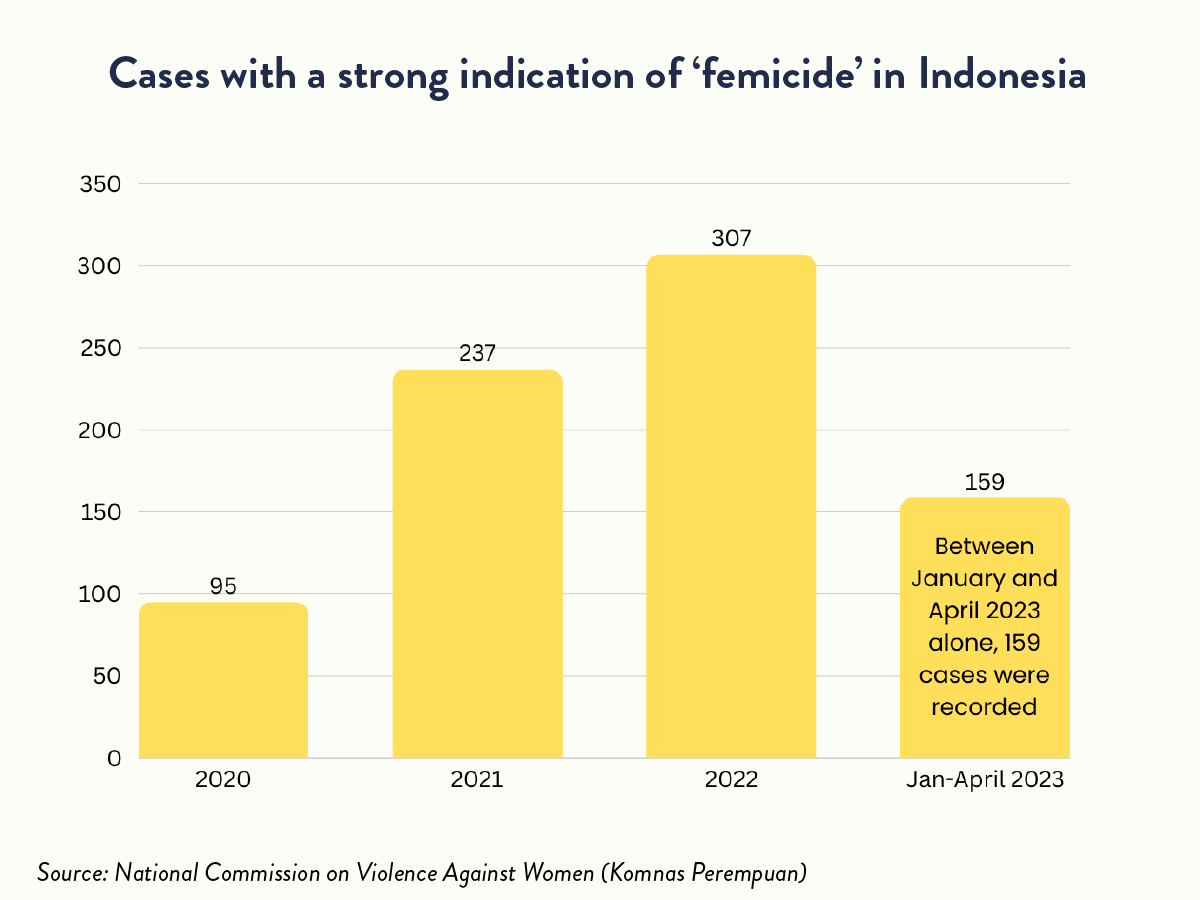Breaking the Silence: Combating Feminicide and Gender-Based Violence in Indonesia
Femicide is an alarming and growing reality for women in Indonesia. In May 2024, 23-year-old R.A. from Bogor was found dead inside a suitcase on the Panjang Jimbaran Bridge in Badung, Bali, allegedly murdered by her partner, Amrin Al Rasyif. Similarly, in May 2022, 22-year-old Indah Fitriyani from Panguragan, Cirebon District, was brutally murdered and her body concealed in a cupboard by her partner, Casnadi. These horrifying incidents, while shocking in their brutality, are not isolated tragedies but part of a systemic and growing crisis across Indonesia. The scale of this violence becomes even more apparent when examined through national data, which reveals an alarming upward trend in gender-based violence and femicide.
According to Ratnawati from the National Commission on Violence Against Women (Komnas Perempuan), Indonesia reported 95 cases with strong femicide indications in 2020, 237 in 2021, and 307 in 2022. Alarmingly, between January and April 2023 alone, 159 cases were recorded, signalling an urgent need for comprehensive measures to prevent and address gender-based violence in the country.

The deep roots of gender-based violence and rising tide of conservatism
This crisis is not unique to Indonesia and is part of a wider trend across the Asia Pacific region – in 2017 alone, 20,000 women were killed by intimate partners or family members in Asia and the Pacific. Gender based violence thrives in a culture where social and religious stigma, inadequate legal protections and patriarchal norms protect perpetrators and make it difficult for victims to report abuse, rendering this violence and their victims invisible.
In Indonesia, this issue is especially acute, as patriarchal values and restrictive gender norms dominate societal structures, limiting women’s autonomy and exposing them to heightened risks of violence and femicide.
While women’s movements have made significant strides in advancing gender equality—reflected in Indonesia’s “fast progress” in the 2024 SDG Gender Index—these achievements have provoked backlash, exacerbated by rising conservatism and nationalism.
Religious narratives, such as the belief in “wifely obedience” as a path to heaven, have been weaponised to reinforce male dominance and justify abuse—reflected in a fifth of Indonesian women believing partner violence can be justified under circumstances such as “burning the food, arguing with the spouse, going out without telling him, neglecting the children, or refusing to have sex.”
As economic empowerment and shifting labour patterns challenge traditional male hegemony, extremist organisations have intensified efforts to recruit youth, promoting patriarchal and Islamist ideologies that deny women’s autonomy. This cultural resistance not only fuels gender-based violence but also obstructs efforts to address it effectively.
A legal system failing victims
This context silences victims, making it incredibly difficult for women to report abuse. Stigma, fear of judgment, and a lack of trust in legal protections deter many from seeking help, leaving the vast majority of cases unreported and perpetrators unaccountable.
The challenge of securing justice for women is particularly acute in the Asia-Pacific region, which is the poorest-performing region globally when it comes to women’s access to justice according to the 2024 SDG Gender Index. This has been one of the region’s weakest indicators, and alarmingly, it has declined since 2015, more so than any other region. This regression reflects systemic failures to prioritize women’s rights, leaving them more vulnerable to violence and without the protections they urgently need.
In 2021, approximately 6.6% of women aged 15-64 in Indonesia reported experiencing physical, sexual, or emotional violence from their spouses/ex-spouses in the previous 12 months, this translates to over 6 million women experiencing violence in just one year. Yet, concerningly, only 7,435 cases were reported to police, highlighting the great disparity between prevalence and reporting.
Even when cases were reported, Komnas Perempuan found a concerning link between delayed or neglected handling of domestic violence cases and an increased risk of indirect femicide, where prolonged abuse leads to suicide. This reflects how deeply cultural stigmas permeate the legal system, with women often not being taken seriously, fostering mistrust and further discouraging victims from seeking justice.
Steps have been taken to address gaps in legal frameworks with the landmark Sexual Violence Crime Bill being passed in 2022, acknowledging previously unrecognized forms of sexual violence, and expanding the rights of victims. This bill was the result of over a decade of advocacy led by Komnas Perempuan and other human rights and women’s groups in the country.
Yet their work continues, highlighting that this legislation still does not directly address femicide, or recognize gender-based motivations in homicide cases, meaning that the systemic and gendered nature of these crimes often goes unaddressed. This gap is not unique to Indonesia; across Asia and the Pacific femicides are rarely codified as distinct crimes. Global movements tackling gender-based violence emphasise that recognizing femicides as a unique offense is a crucial step in ensuring justice for victims and protection for at-risk women.
A multi-faceted approach to tackling femicide
Tackling gender-based violence and femicide requires a multifaceted approach that combines legal, social, and cultural changes. Beyond strengthening legal frameworks and the recognition of femicide, women’s groups in the country like Komnas Perempuan are pushing for better monitoring and data collection on femicide cases to understand the full scope of the problem including the establishment of a watchdog. The movement to end child marriage in the country provides a great example of the importance of data-driven advocacy to implement and monitor change.
They also recognise the need to shift cultural views with public awareness campaigns and enhance support for victims. This includes specialized training for law enforcement to ensure sensitive handling of cases and more comprehensive support services for victims, including safe houses, financial aid, and psychological support.
Empowering women economically and safeguarding their rights in all spheres are equally crucial in reducing vulnerabilities. Indonesia’s “poor” score of 67.9 out of 100 on the 2024 SDG Gender Index highlights the broad structural and societal barriers women face, from financial and housing insecurity to limited personal autonomy, individual rights and freedom from discrimination.
Moving toward safety and equality
Indonesia’s feminicide crisis is part of a broader challenge, both within Asia and the Pacific and globally. As the 2024 SDG Gender Index highlights, gender-based violence and insecurity are pervasive, with only 57% of women globally feeling safe walking alone at night. Addressing this requires comprehensive change, along with regional cooperation. Asian-Pacific countries share many of the same challenges and can benefit from coordinated strategies, shared resources, and knowledge exchange to combat this issue collectively. Women’s rights movements across the region are already at the forefront of this fight. It is imperative that we support their efforts with funding, and amplify their voices and inclusion in political and decision-making spaces.
This 16 Days of Activism, we want to highlight the urgent need to take action, in Indonesia and beyond. The 2024 SDG Gender Index warns that without decisive action, global gender equality may remain out of reach until the 22nd century. We must act now !
By addressing the root causes of gender inequality, empowering women economically, and fostering accountability and justice, Indonesia and its neighbours can take meaningful steps toward a future where women are truly safe, equal, and free from violence.
This series of blog posts done by Equal Measures 2030 aims to raise awareness during the 16 Days of Activism and the International Day for the Elimination of Violence Against Women, to shed light on this issue and the need for comprehensive and comparable data. Read the other blogs in this series:
- Kenya’s urgent battle against femicide
- Resisting Violence, Reimagining Equality: The Power of Gender Data and Capacity Building
- Why addressing gender-based violence (and counting it) matters for gender equality
- The most unsafe place to be a woman shouldn’t be their home: A closer look at femicide rates in Brazil



